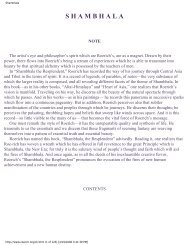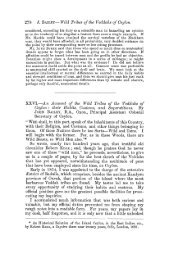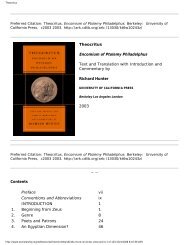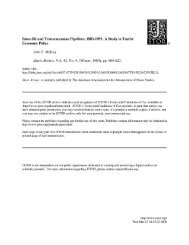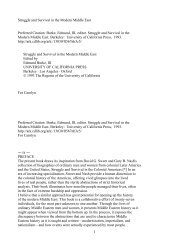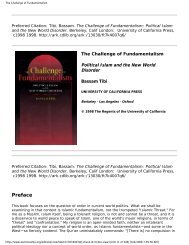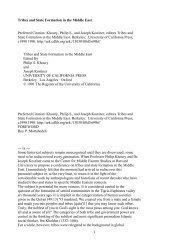Between Two Worlds Kafadar.pdf
Between Two Worlds Kafadar.pdf
Between Two Worlds Kafadar.pdf
Create successful ePaper yourself
Turn your PDF publications into a flip-book with our unique Google optimized e-Paper software.
Èek deveyi güt koyunu<br />
Bir gün olur beglenirsin<br />
Do not cultivate a vineyard, you'll be bound.<br />
Do not cultivate grains, you'll be ground.<br />
Pull the camel, herd the sheep.<br />
A day will come, you'll be crowned.<br />
The poem was recorded by an ethnographer in the earlier part of this century<br />
among the seminomads who survived in the hills of the Bithynian Olympus where<br />
Osman's tribe once roamed. Maybe the thirteenth-century tribesfolk did not know<br />
this particular quatrain, but its lesson was certainly not lost on them. While<br />
they roamed rather than settling down to agriculture, "a day came," and a<br />
certain Osman, who seems to have been a leading member of the tribe's leading<br />
house (or rather, tent), imagined that he could carve a body politic under his<br />
leadership, that he could be Osman Beg. He decided to seize that opportune<br />
moment and never looked back.<br />
Determining the auspicious "day" to assert one's will over a tribe in such a way<br />
as to make explicit its political nature was a matter of sensing the opportune<br />
moment and seizing it.[1] As implied by the term used in premodern Islamic<br />
sources for the making of a political bid, huruc (com-<br />
― 119 ―<br />
ing out), the earlier history of the bidder is often obscure. There must have<br />
been many "closet begs" at any given moment waiting for their opportunity to<br />
come out; many brave men must have thought their moment had come to be begs and<br />
failed. When a "sortie" is not successful, it is of course no more than an<br />
assault or revolt, and the word huruc is commonly used in that sense as well,<br />
which gives a good indication of the problem of legitimacy involved in such a<br />
claim. But a very rigorous test of verifiability was built into any claim of<br />
this sort: you would succeed only if your bid had divine sanction; if you<br />
succeeded, you could claim to have divine sanction and thus legitimacy — an<br />
argument a bit circular perhaps, but not sloppy.<br />
This transformation, the assertion of a political will by the proto-Ottomans,<br />
seems to have occurred in Osman's generation, as will be discussed below. It is<br />
impossible to say anything with certainty about the earlier history of that<br />
tribe and the process whereby it started to play the role that it did.<br />
Once it did initiate its political bid, the small tribe of Osman entered into<br />
competition with various Turco-Muslim and Christian rivals in the area. The<br />
tribe was eventually able to establish its hegemony, but it was no foregone<br />
conclusion that there would be one power as the ultimate winner and that it<br />
would be the House of Osman. Even if by the end of the thirteenth century it<br />
could be expected — and that is highly doubtful — that the Turco-Muslim forces<br />
would consume the Byzantine Empire, there was no reason to assume that all of it<br />
would fall into the hands of one dynasty. And even if that were to be expected,<br />
105




